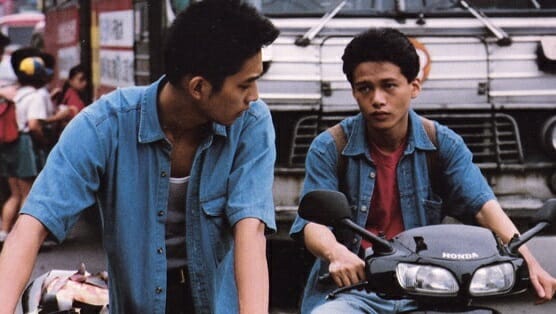Rebels of the Neon God

If Tsai Ming-liang hadn’t beaten Nicolas Winding Refn’s career to the punch by several years, Rebels of the Neon God would have been a killer moniker for one of the great Dane’s as-yet-unimagined future projects. Even in that alternate timeline, though, Tsai’s debut feature comes from such a culturally specific place that only he could have conceived it. (The film premiered in 1992, but has only just managed to secure a U.S. release more than two decades after the fact.) The title refers to Nezha, an impulsive, rash child deity of classical Chinese mythological origins. For Tsai’s purposes, though, that name reflects just as keenly on the first of his film’s dueling protagonists, Hsiao-kang (Lee Kang-sheng), who represents one side of a coin Tsai sets pirouetting above the endless, thrumming streets of Taipei.
Hsiao-kang is a cram student who lives most of his life between the confines of his parents’ apartment and his school. He’s a quiet, well-behaved kid, or at least he gives the impression of being well-behaved; Tsai takes his time revealing the character’s eccentricities, so best not let looks fool you. (His mother thinks he’s Nezha reincarnated. That alone speaks volumes about his upbringing.) Hsiao-kang strikes a sharp contrast to the movie’s second lead, Ah-tze (Chen Chao-jung), who spends his days sleeping in his brother’s flooded, decrepit apartment and his evenings robbing payphones and blowing the proceeds playing arcade games with his chum Ah-bing (Jen Chang-bin).
Rebels of the Neon God establishes the distance that separates Hsiao-kang’s world from Ah-tze’s within its opening frames. The former struggles to study in his room while the latter commits petty theft and plays Street Fighter II. But while Tsai introduces us to Hsiao-kang and Ah-tze straight away, he takes considerably longer acquainting them with each other. When he does, it’s in a fleeting moment when an impetuous Ah-tze destroys the side-view mirror on the taxi Hsiao-kang’s dad drives. Hsiao-kang spends the rest of the film unraveling; he stalks Ah-tze, shadowing him at arcades and in food courts, where he canoodles with his crush, Ah-kuei (Wang Yu-wen). It’s unclear whether Hsiao-kang is out for retribution or, perhaps, a chance connection. Hsiao-kang resents Ah-tze as much as he wants to be just like him, and why not? Ah-tze lives by his own rules, unshackled by the expectations of others. (There’s a reason Tsai periodically invokes the specter of James Dean.) He isn’t burdened by yearning, as Hsiao-kang is.
-

-

-

-

-

-

-

-

-

-

-

-

-

-

-

-

-

-

-

-

-

-

-

-

-

-

-

-

-

-

-

-

-

-

-

-

-

-

-

-








































